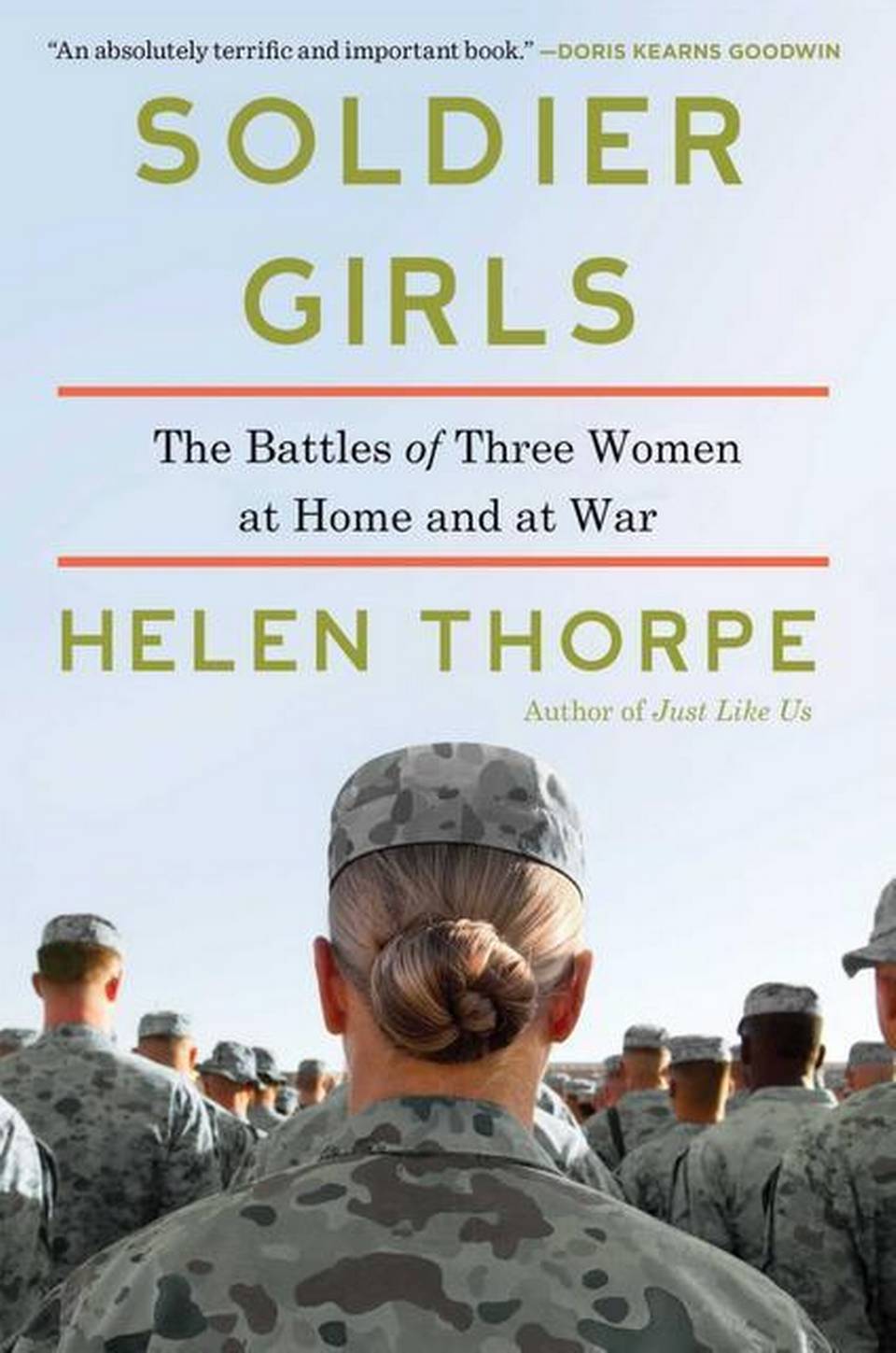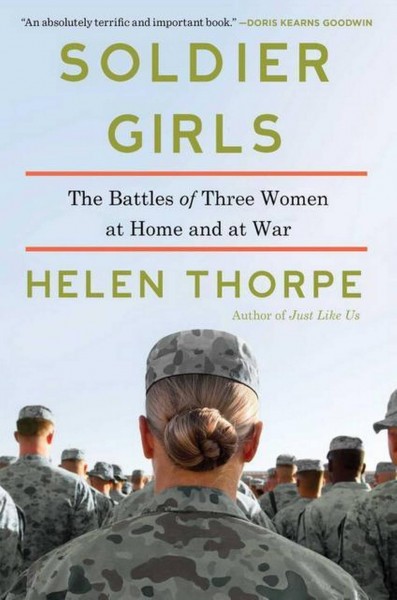
13 Nov Tall Tales: “Soldier Girls,” Interview with Helen Thorpe
Helen Thorpe is an author and freelance journalist who has written articles for the New York Times Magazine, the New Yorker, Texas Monthly, Westword, and 5280. Her first book, “Just Like Us,” was published by Scribner in 2009 and named one of the best books of the year by the Washington Post. The Denver Center for the Performing Arts adapted the book for the stage in 2013. Thorpe’s latest book, “Soldier Girls” was published by Scribner in August 201. Famous in her own right, Thorpe is married to (though living separately from) another famous name, Colorado’s (still) Governor Hickenlooper.
Below TIO regular contributor Mark Stevens reviews “Soldier Girls” and interviews the author.
Soldier Girls was named as an Editor’s Choice in the New York Times and one of the best books of the year by the Washington Post.
Following Just Like Us, Helen Thorpe’s moving portrait of four Denver high school students whose parents entered the United States illegally from Mexico illegally, Soldier Girls again demonstrates Thorpe’s remarkable ability to disappear inside a subculture and vacuum up details like a whole squadron of top-flight reporters.
Soldier Girls tracks three women who signed up for the Indiana National Guard—Michelle Fischer, Debbie Helton and Desma Brooks. The book tracks these women for ten years, from 2003 to 2013.
As the New York Times wrote, “Ms. Thorpe’s sharply drawn portraits are novelistic in their emotional detail and candor, underscoring the very different philosophical and political outlooks held by these three women before they went off to war, and the transformative effect (positive and negative) that their service would have on their daily lives, their sense of self and their relationships back home.”
An interview and review of Soldier Girls follows.
First, Thorpe was kind enough to answer a few questions about the book and the work that went into it.
Question: When did this idea occur to you? What was the spark? And how did you even begin the process of finding these women?
Thorpe: My first book was published in 2009, and the entire time that I was working on it, I was acutely aware that there were two wars going on, and that I couldn’t follow the news very well. I felt frustrated by my inability to comprehend what we were doing in Afghanistan and Iraq, and what was happening to the people we were sending over there. After Just Like Us came out, I started interviewing veterans who were coming home from the two conflicts, trying to see if there was a story there that I could tell. When I met Michelle, Debbie, and Desma, I felt I had found the right veterans for me, because we all got along so well together. These are three very funny and very smart women who lived through dramatic, historic developments, and came home struggling but still trying to find ways to laugh about it all, so that they could get through the experience. I admired them tremendously and was drawn to their humor and resilience.
Question: How many candidates did you screen or interview before deciding on these three? Was there ever a point in the process where you were worried that one of them might walk away?
Thorpe: I think I interviewed about two dozen veterans before settling on these women. I found it easier to speak to women in general, during the early screening interviews. The men were more wary of me. I’m obviously a) a civilian and b) female and also c) center or left-leaning, depending on the issue, and so I think many of them must have felt as though I might not be the right person to open up to. I didn’t have that issue with Michelle, when I met her early in 2010. We just fell into talking right away. And when she introduced me to her two friends, I also developed strong relationships with each of them fairly quickly. I think it mattered a lot that we were all women and that they had strong female friendships. Once they took me into their circle, they started speaking to me as if I was one of the club, almost.
Question: Soldier Girls focuses on how females struggle to find their way in a male-dominated culture, but it’s also about the transition back to their homes—the mental fortitude required to endure the adjustments going in and going out. Were you surprised that the return was as difficult as the induction?
Thorpe: I knew that it would be hard to come home, but I didn’t understand exactly why. In fact, that was one of the aspects of the experience that I felt the most curiosity about. We all know that veterans struggle to come back after going to war—but it’s hard for a civilian to empathize properly, because the struggle is foreign and unknown to us. I wanted to know more about why it’s so hard. I think the answer has a lot to do with time and change. It’s impossible to return to the person you used to be. You can come home, but you can’t go back. And so coming home means confronting in so many ways the fact that you have changed, and so have the people that you left behind. Everything is different, including the veteran. It can almost feel as though home is gone, in a sense. You have to build a new home.
Question: Can you tell us a little bit about your research process for each profile? How do you reach a point in a relationship with a subject you’re writing about that they feel comfortable talking about all the times they breached personal trust, city and state laws, and military rules?
Thorpe: I am naturally reluctant to judge. I am a good listener. Mostly I am just curious about people, and their motivations. It matters more to me to understand why a person does a certain action, as opposed to coming to a moral conclusion about whether they should or should not have done something. With Michelle, Desma, and Debbie, I started by asking very basic questions, just to get a sense of the timeline of events. When did they enlist, where did they deploy, how long did they stay, and so forth. I didn’t ask more probing questions for a long time. By the point we began talking about their interpersonal relationships, we had spent many months together. By then I think they knew that I was a careful person who would write about them in a thoughtful way. I also explained to them that the most powerful book would be one in which the readers could relate to them as real people – flawed human beings, just like the rest of us.
Question: You accumulated such a terrific level of detail in the writing that it gives the profiles an extraordinary level of veracity, but again how do you go about gathering detail from daily routines a decade prior?
Thorpe: We started with basic interviews, trying to assemble general facts. From there we did many more in-depth interviews, drilling down into the moments I thought I was likely to write about. Then I asked for any documentary evidence they could share. They gave me photographs, emails, letters, diaries, military records, medical records, and therapy notes. The hard part was rejiggering all of that material to get it into chronological order. I put piles of paper in stacks on the floor and sat down and tried to separate the pages into the right sequence—taking the part of one interview that was about events which occurred in 2001 and putting it to the left, taking another part of the same interview that was about events which occurred in 2004 and putting it to the right, reordering pages until the content was in the right timeline. Then I made three-ringed binders and filed all of that material in the right time-ordered sequence. It was laborious! But worthwhile. I couldn’t have written the book otherwise.
Question: Did you ever feel the urge to provide counsel?
Thorpe: No.
Question: Were you surprised to find someone who was so critical of the war effort and yet who put on a uniform and went to Afghanistan?
I thought that was the key to Michelle’s appeal, for the reader who had been critical of the wars. So many people in this country felt we shouldn’t have invaded Iraq. And some even felt that we shouldn’t have been in Afghanistan. If you had those feelings, then it was tempting to turn away and not pay attention. I wanted to write a book that would entice even people who wished the wars had never happened into reading about them, so that they could have a more informed sense of what had been taking place. And yes, it was surprising to me to meet Michelle and learn how somebody with anti-war views could wind up serving as a soldier in Afghanistan.
Question: Okay, just how difficult was it to ask these women to tell all about their sex lives and their relationships? Did you know going in that this would be such a critical part of the story?
Thorpe: Actually, I didn’t ask. Either they volunteered the information about themselves, or they talked about each others’ relationships in front of me.
It had never occurred to me that intimate relationships would be a big part of the story. When I first started working on the book, I was drawn to the idea of writing about a college student with no kids, a single mom with three kids, and a woman who became a grandmother while they were all deployed together to Afghanistan. I liked that there was thirty years difference in age from the youngest to the oldest of the main characters, and I liked that there was that much difference between the three women in terms of their politics.
But when they did start talking about sex, I thought, well, maybe that will keep the reader engaged!
Question: How has your personal view of the military changed since you began work on Soldier Girls?
Thorpe: I think I understand better how heterogeneous the military actually is. Outsiders tend to view the military as a homogenous group of people, who think and act in lockstep. Actually it’s much more interesting than that, culturally. What’s fascinating about the military is the way it introduces people who might never otherwise meet and sometimes puts them in harm’s way together, where they can go through the kinds of experiences that transform a group into a family.
Question: What’s next?
Thorpe: Still working on that one. Stay tuned!
Review:
War is hell. It’s also real people transforming themselves—sometimes briefly, sometimes for decades—into soldiers. It’s also equipment, food, supplies and housing. It’s also bureaucracy, codes, lingo, power. It’s killing. War is boredom and routine. War requires that families separate and relationships go on hold—for long stretches of time. War requires induction. The military is its own universe, as a thousand books and movies have made clear.
In three highly detailed portraits of three women shipped off to war, Soldier Girls lets us walk in the boots of Michelle Fischer, Debbie Helton and Desma Brooks as they each strike a bargain with the world—and the military—for unique, personal reasons. Soldier Girls transforms the generic term “soldier” into highly specific human beings with hopes, dreams, struggles and reasons to join up.
Thorpe spent four years interviewing these women, covering the details and getting them right. The specifics give Soldier Girls its weight, its three-dimensional insights. Generalities are devoured by the sharp razor teeth of particulars.
“Michelle had saved up $1,300 for an apartment in Bloomington. Instead, she ordered kegs of Killian’s Irish Red and threw a party, took friends out to dinner, bought her mother a new bed. She also took out a large life insurance policy and wrote a will leaving everything to her mother.”
“In her (Debbie’s) civilian life, she managed a beauty salon inside a department store at one end of a shopping mall. The department store was called L.S. Ayres. Debbie lived in Bloomington, Indiana, where she had grown up and was raising her daughters . . . On the morning of September 11, 2001, Debbie left her house around nine, as the drive to Indy took roughly an hour. At about 9:15 a.m. she was heading northeast on Highway 37 in the gold 1990 Cavalier she had bought used after she had enlisted in the Guard, and could finally afford a vehicle, listening to the Bob & Tom Show. A person had to have a sick sense of humor to enjoy the syndicated comedy show, but it was Debbie’s main source of news.”
“Desma was extraordinarily bright, and before she finished elementary school, she devoured The Secret Garden and Little Women. Later she raced through Oliver Twist and The Raven. The books spirited her away from her surroundings and shielded her from her mother’s rage.”
Thorpe shows us the politics—or lack thereof. She let us in on their relationships, bank accounts, extended families, and decisions about how each of these three women react to offers and temptations of all kind. We see them re-shape themselves, mentally and physically. War requires transformation. We see them learn new skills, such as learning to repair assault rifles. Thorpe shows us their willingness to toe the line or buck the system. We see the women as they manage sleep, cope with dread and look for love and physical intimacy. We see them manage family business by remote control—from thousands of miles away—via email and telephone. We learn their preferences in music, food and alcohol. We see them feud and we see them figure out ways to make do. And, even though they mostly are assigned to support roles, one hair-raising moment brings one of these women extremely close to losing her life.
If going to war is brutal, the return trip might be worse. And here is where the accumulated minutia of the opening chapters pays off as the women return to the old landscapes and familiar haunts and try to regain their footing in the world.
About the role of women in the military, Thorpe retains her role as reporter and never shifts to dispenser of opinion. Can they handle the work? Can the military culture handle the sexual complications? Thorpe never loses patience. The narrative doesn’t rush to closure. Awkward moments are allowed to be just that. War is hell. Returning requires recalibration. War’s toll is in the dead and wounded. It’s also in the altered psyches of those who appear whole upon return. War builds character? Sure. And if so, Helen Thorpe’s powerful Soldier Girls shows that women—at least these three—are up to the task.
Editor’s note: Telluride Inside… and Out’s monthly (more or less) column, Tall Tales, is so named because contributor Mark Stevens is one long drink of water. He is also long on talent. Mark was raised in Massachusetts. He’s been a Coloradoan since 1980. He’s worked as a print reporter, national news television producer, and school district communicator. He’s now working in the new economy and listed under “s” for self-employed. Mark has published two Colorado-based mysteries, “Antler Dust” (2007) and “Buried by the Roan” (2011). Midnight Ink will publish the third book, “Trapline,” in the fall of 2014 and is under contract for a fourth book in the series, too. For more about Mark, check out his website.





Sorry, the comment form is closed at this time.